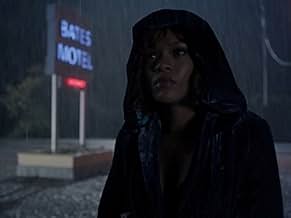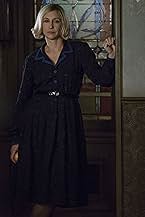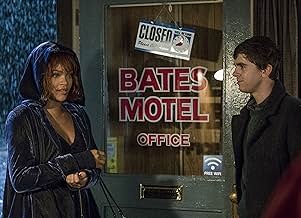Marion
- Episode aired Mar 27, 2017
- TV-14
- 45m
IMDb RATING
9.2/10
2.3K
YOUR RATING
A special guest checks into the motel; Dylan grapples with devastating news; Sam and Madeleine's marriage reaches a crossroad.A special guest checks into the motel; Dylan grapples with devastating news; Sam and Madeleine's marriage reaches a crossroad.A special guest checks into the motel; Dylan grapples with devastating news; Sam and Madeleine's marriage reaches a crossroad.
9.22.2K
1
2
3
4
5
6
7
8
9
10
Featured reviews
Why oh why did they change it!!!!
I'm
Sorry- I don't care if Rihanna was a fan of the show- she should NEVER EVER have been allowed to be in such a brilliant price of tv drama! They ruined the entire show by 1) having her play one of the most iconic screen icons ever (she can't bloody act!!!!) and 2) the screwed with the whole point we'd been waiting 5 seasons to see!!! Why oh why did they do this!!! I'm never gonna forgive the writers for this!!
Deception in the classic shower scene!
I did not like Marion because of the classic shower scene, I think that it distorted the classic, but it's part of it, for me the best episode is still "Norma Louise" (¨6) of the third season, however the 4 and 5 seasons are the best ! I think now it has become less interesting the series, a pity has never been a series as good as Hannibal, but came in a crescent, now disappointed!
This episode deftly balances homage with innovation, blending suspense, psychological drama, and dark humor while challenging audience expectations
The sixth episode of Bates Motel's fifth season, titled "Marion" and directed by Phil Abraham, marks a highly anticipated and masterfully executed moment in the series as it revisits and reimagines the iconic shower scene from Alfred Hitchcock's Psycho. Developed by Carlton Cuse, Kerry Ehrin, and Anthony Cipriano, this episode deftly balances homage with innovation, blending suspense, psychological drama, and dark humor while challenging audience expectations. It stands as both a narrative pivot and an emotional climax within the season's broader exploration of identity, obsession, and survival.
"Marion" picks up immediately from the previous episode's events, introducing Rihanna's Marion Crane as a new tenant at the Bates Motel. The episode opens with her arrival in a torrential downpour, a mood-setting visual that recalls classic film noir and Gothic atmospheres. Marion registers under the alias "Marie Samuels," referencing Hitchcock's original script, instantly weaving the show's universe with its cinematic roots. The low-lit motel office, the sharp sound design of rain hitting surfaces, and Norman Bates' (Freddie Highmore) unnervingly polite yet awkward demeanor establish a haunting tone that blends discomfort with curiosity.
Freddie Highmore's portrayal of Norman in "Marion" is especially compelling. His character displays an unsettling blend of eagerness and restraint, captured with subtle but potent precision. The episode's standout scene where Norman offers Marion a ham sandwich in the office evokes a deliberate recreation of the original Psycho moment, but with nuanced sensibility. The tension arises not from overt menace but from the quiet awkwardness and Norman's volatile internal state, exemplified later when he confronts the spectral presence of Norma (Vera Farmiga) in the house. Highmore's performance channels both vulnerability and creeping instability, especially during scenes where he argues with Norma, his accusations of her unreality met with her chilling repudiation-a testament to the writing and direction's psychological depth.
Vera Farmiga's Norma remains a captivating force despite her character's spectral status. Her presence in Norman's hallucinations oscillates between haunting and darkly comic, notably in the kitchen scene where she smashes objects to prove her existence to him. This sequence, visually striking and emotionally raw, showcases Farmiga's range and the episode's deft blending of horror and tragedy. The fractured mother-son dynamic remains at the emotional heart, reflecting the series' enduring thematic concerns with co-dependency and identity fragmentation.
One of the episode's most audacious and memorable elements is its reinvention of the famous shower scene. Bates Motel subverts expectations by delaying the anticipated violence-when Marion strips and steps into the shower, Norman watches from the peephole, tension mounting alongside Bernard Herrmann's iconic score. Yet, rather than the immediate brutal attack, Marion unexpectedly exits, dresses, and confronts Norman directly in the office. Their tense exchange reveals Marion's lingering fears and Norman's guarded truths, adding layers to the scene's psychological complexity. This twist enriches the legacy of the original scene, adding depth and agency to Marion's character.
Isabelle McNally's portrayal of Marion lends grace and subtle strength, humanizing a character who could have been a mere plot device. Her interactions with Norman and her discovery of Sam Loomis' (Austin Nichols) infidelity amplify the narrative's emotional stakes. The episode also explores Marion's breakdown upon confronting the truth at Sam's home, dramatized with urgency and frustration that provide texture to her motivations. Her decision to flee, abandoning her belongings and severing ties with her old life, underscores themes of escape and reinvention.
The episode's cinematography and production design are exemplary, harmonizing moody low lights, reflections, and claustrophobic framing to evoke a persistent sense of unease. Phil Abraham's direction ensures a balanced rhythm, tempering suspense with moments of character intimacy and emotional revelation. The editing serves the unfolding tension well, with deliberate pacing allowing scenes to breathe and the iconic score to punctuate critical moments without overwhelming.
Additionally, while the shower scene's subversion is lauded by many, a few find the delay of violence diminishes immediate impact, making the scene's power a slow-burning rather than explosive payoff. Yet these reservations are outweighed by the episode's overall effectiveness in weaving homage, character, and suspense.
Culturally and cinematically, "Marion" exemplifies Bates Motel's unique blending of classic suspense traditions with contemporary serialized storytelling. The episode dialogues with Hitchcockian motifs while innovating with perspective and character agency, challenging the legacy of Psycho's narrative through a modern, psychologically sophisticated lens. It also resonates with broader themes in television and film regarding female agency, trauma, and survival within oppressive systems.
"Marion" is a standout episode that combines reverence for its source material with bold narrative choices and remarkable performances. It deepens the psychological intricacies of Norman Bates' world while offering nuanced portrayals of characters caught in webs of deception, desire, and self-preservation. Phil Abraham's assured direction, coupled with a richly textured script and stellar acting, crafts an episode that is suspenseful, emotionally resonant, and intellectually engaging.
"Marion" picks up immediately from the previous episode's events, introducing Rihanna's Marion Crane as a new tenant at the Bates Motel. The episode opens with her arrival in a torrential downpour, a mood-setting visual that recalls classic film noir and Gothic atmospheres. Marion registers under the alias "Marie Samuels," referencing Hitchcock's original script, instantly weaving the show's universe with its cinematic roots. The low-lit motel office, the sharp sound design of rain hitting surfaces, and Norman Bates' (Freddie Highmore) unnervingly polite yet awkward demeanor establish a haunting tone that blends discomfort with curiosity.
Freddie Highmore's portrayal of Norman in "Marion" is especially compelling. His character displays an unsettling blend of eagerness and restraint, captured with subtle but potent precision. The episode's standout scene where Norman offers Marion a ham sandwich in the office evokes a deliberate recreation of the original Psycho moment, but with nuanced sensibility. The tension arises not from overt menace but from the quiet awkwardness and Norman's volatile internal state, exemplified later when he confronts the spectral presence of Norma (Vera Farmiga) in the house. Highmore's performance channels both vulnerability and creeping instability, especially during scenes where he argues with Norma, his accusations of her unreality met with her chilling repudiation-a testament to the writing and direction's psychological depth.
Vera Farmiga's Norma remains a captivating force despite her character's spectral status. Her presence in Norman's hallucinations oscillates between haunting and darkly comic, notably in the kitchen scene where she smashes objects to prove her existence to him. This sequence, visually striking and emotionally raw, showcases Farmiga's range and the episode's deft blending of horror and tragedy. The fractured mother-son dynamic remains at the emotional heart, reflecting the series' enduring thematic concerns with co-dependency and identity fragmentation.
One of the episode's most audacious and memorable elements is its reinvention of the famous shower scene. Bates Motel subverts expectations by delaying the anticipated violence-when Marion strips and steps into the shower, Norman watches from the peephole, tension mounting alongside Bernard Herrmann's iconic score. Yet, rather than the immediate brutal attack, Marion unexpectedly exits, dresses, and confronts Norman directly in the office. Their tense exchange reveals Marion's lingering fears and Norman's guarded truths, adding layers to the scene's psychological complexity. This twist enriches the legacy of the original scene, adding depth and agency to Marion's character.
Isabelle McNally's portrayal of Marion lends grace and subtle strength, humanizing a character who could have been a mere plot device. Her interactions with Norman and her discovery of Sam Loomis' (Austin Nichols) infidelity amplify the narrative's emotional stakes. The episode also explores Marion's breakdown upon confronting the truth at Sam's home, dramatized with urgency and frustration that provide texture to her motivations. Her decision to flee, abandoning her belongings and severing ties with her old life, underscores themes of escape and reinvention.
The episode's cinematography and production design are exemplary, harmonizing moody low lights, reflections, and claustrophobic framing to evoke a persistent sense of unease. Phil Abraham's direction ensures a balanced rhythm, tempering suspense with moments of character intimacy and emotional revelation. The editing serves the unfolding tension well, with deliberate pacing allowing scenes to breathe and the iconic score to punctuate critical moments without overwhelming.
Additionally, while the shower scene's subversion is lauded by many, a few find the delay of violence diminishes immediate impact, making the scene's power a slow-burning rather than explosive payoff. Yet these reservations are outweighed by the episode's overall effectiveness in weaving homage, character, and suspense.
Culturally and cinematically, "Marion" exemplifies Bates Motel's unique blending of classic suspense traditions with contemporary serialized storytelling. The episode dialogues with Hitchcockian motifs while innovating with perspective and character agency, challenging the legacy of Psycho's narrative through a modern, psychologically sophisticated lens. It also resonates with broader themes in television and film regarding female agency, trauma, and survival within oppressive systems.
"Marion" is a standout episode that combines reverence for its source material with bold narrative choices and remarkable performances. It deepens the psychological intricacies of Norman Bates' world while offering nuanced portrayals of characters caught in webs of deception, desire, and self-preservation. Phil Abraham's assured direction, coupled with a richly textured script and stellar acting, crafts an episode that is suspenseful, emotionally resonant, and intellectually engaging.
10vrcotier
Brilliant!!
The episode I've been waiting for! Brilliantly done with a twist that will leave you cheering! Faithfully following the master I thought I knew what was coming. I was tricked but knew they had to move in a different direction. Then, sweet payment for the wait! Best season ever!
Blood Shower from Inside
Who has not seen Psycho? If you are one of those people maybe this chapter is not so shocking, or in any case maybe it's much more. "Marion" marks a before and after in Bates Motel, now there is a free way for this series, that although it had already created its own personality from the beginning, now if it marks an outline in which it shouts in the face "This not Is Pshyco. "And it's fine, it's very well since it faithfully respects the original material, but doesn't want to be a copy of this, Norman Bates's story is a rather rich and interesting, and since last season have developed more the concept, Introducing ourselves to what this disorder and Norman's mind implies. Bates Motel has taken a very big risk in this chapter, but a necessary risk, we can appreciate the value of the series and enjoy the same way the shower scene because if, that scene is here, picture to picture, but you have to know something, if you thought that the plot twist of Norma's death was big, wait to see this.
Did you know
- TriviaAs Norman checks Marion into her room, he tells her about the stationery with the motel name on it, using the same dialogue from Psycho (1960).
- GoofsIn the article Emma is reading about Norma's death, Norman's age is given as 18. However in an earlier episode, when we see Norma and Norman's joint gravestone, it gives Norma's year of death as 2015 and Norman's year of birth as 1995. That would have made Norman 20 years old, not 18, when his mother died.
- Quotes
Norma Louise Bates: You're mad because I left.
Norman Bates: I'm not mad. Well, except in the British sense of the word, like the Mad Hatter. In that way, I am mad. But the world is full of mad people who function, many of whom are heads of state.
- SoundtracksCrying
Written by Roy Orbison (uncredited) and Joe Melson (uncredited)
Performed by Roy Orbison (as Rob Orbison)
Details
- Release date
- Country of origin
- Language
- See more company credits at IMDbPro
Contribute to this page
Suggest an edit or add missing content



















